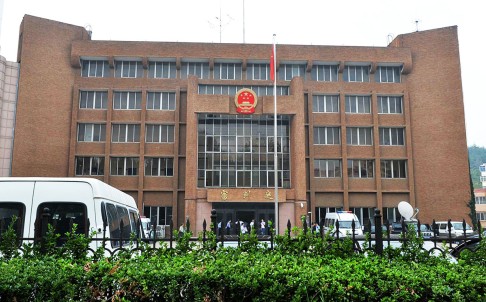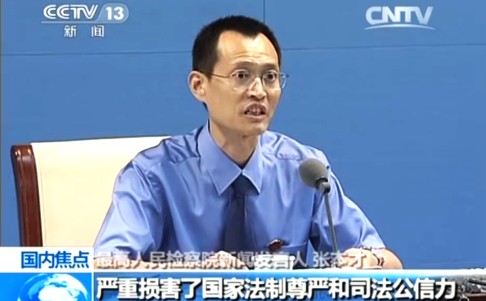China issues new rule to stop wealthy from buying their way out of jail
Prosecutors told to keep a closer watch on bids by wealthy and powerful inmates to buy their way to shorter sentences or early release
PUBLISHED : Wednesday, 27 August, 2014, 4:07am
UPDATED : Wednesday, 27 August, 2014, 11:43am
Andrea Chen [email protected]

The Supreme People's Procuratorate announced that local prosecution staff must review all applications for sentence reductions. Photo: Xinhua
Top prosecutors have ordered greater scrutiny to ensure corrupt officials and law-breaking business executives do not use money or exert power to avoid serving their full sentences.
The instructions came in a new directive on sentence reductions and parole.
The Supreme People's Procuratorate announced yesterday that local prosecution staff must review all applications for sentence reductions and parole if a case involves former officials, people convicted of financial fraud, gang members, terrorists, or other prisoners involved in high-profile cases.
The directive requires at least two staff members from local procuratorates, including at least one prosecutor, to attend court reviews of parole applications.

A spokesman of The Supreme People's Procuratorate addresses the press about the new regulations. Photo: Screenshot via CCTV"
The new regulation basically targets the powerful and the rich in prison. These people are more likely to offer bribes for a sentence reduction," Yuan Qiguo, a department director from the Supreme People's Procuratorate, said.
Yuan said the top procuratorate would also give a new directive on inmates serving sentences outside prison.
The move followed a nine-month investigation that uncovered 711 cases where prisoners were given inappropriate sentence reductions or parole. Of those, 76 cases involved officials at ranks higher than bureau chief.
Under the mainland's criminal law, a local court should hold a hearing after a jail files an application for sentence reduction or parole on behalf of a prisoner.
But legal experts said the court ruling often ended up as an exercise on paper due to a lack of specific guidance on holding hearings and reviewing applications.
"Connections and money have a greater say in the ruling, not the law," Chongqing-based lawyer You Feizhou said.
Hong Daode, a criminal law expert from China University of Political Science and Law in Beijing, said the directive made the process a bit more transparent but hearings for sentence reductions and parole should be open to the public.
"Sometimes local courts simply issue a written review of the case instead of holding a hearing," Hong said.
"Except for cases that involve minors, I cannot think of any hearing [on sentence reduction or parole] that cannot be open to the public, since the hearing will only review behaviour in prison, not the activities that put an inmate behind bars."
The Supreme People's Procuratorate also said yesterday it had launched separate investigations into four former law enforcers suspected of corruption, Xinhua reported.
The four suspects are Sun Hai, former deputy chief of the provincial prison administration in Hebei; Liu Xianming, former police chief of Ceheng county, Guizhou; Wu Jianming, a former judge in Nancheng county, Jiangxi; and Lin An, a former prosecutor stationed at a local prison in Inner Mongolia.
Sun, Wu and Lin are suspected of taking bribes, and Liu of releasing people from detention without authorisation.
The top procuratorate also said it had prosecuted Yang Moulin, former president of Xuancheng's intermediate court, in Anhui province, for corruption and embezzling public funds.
